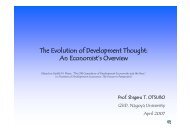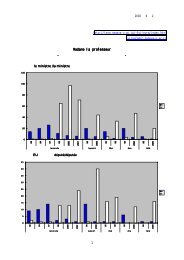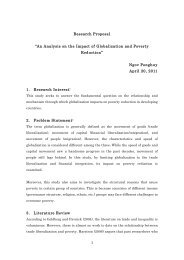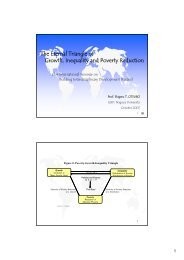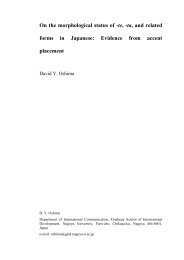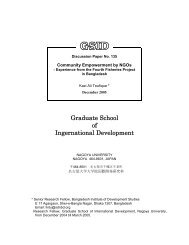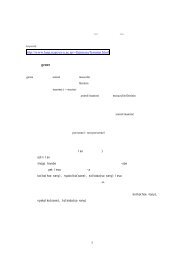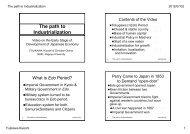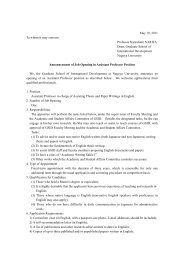Report
Report
Report
You also want an ePaper? Increase the reach of your titles
YUMPU automatically turns print PDFs into web optimized ePapers that Google loves.
P ROSPECTS FOR THE TELECOMMUNICATION SECTOR UNDER SAFTA 173<br />
includes rights to provide international connectivity,<br />
the fee is $500,000 plus a $10 mn performance bond.<br />
LDI licensees will also be subject to ‘stringent requirements<br />
of technical and financial capability, experience<br />
and roll out,’ including specific targets for deployment;<br />
the objective is to raise the barriers of entry to encourage<br />
strategic operators. Companies can obtain permission<br />
to operate in multiple service areas, or to combine LL<br />
and LDI franchises. License duration for both is 20<br />
years. Fees for any spectrum required are subject to<br />
separate licensing fees. Tariffs on both types of licensees<br />
are not regulated for carriers that do not have significant<br />
market power. After a long history of monopoly<br />
control, liberalisation of the basic services sector,<br />
however has not met with much success. In fixed local<br />
loop, PTCL controls 98% of a market which is showing<br />
signs of stagnating. Overall fixed phone service saw a<br />
negative growth of 5% in the quarter ended March 07<br />
and total subscribers were 4,995,902.<br />
Beginning February 2004, additional competition<br />
was introduced in mobile telephony in Pakistan. An<br />
auction was held 14 April 2004, with winning bids submitted<br />
by Norway-based Telenor and UAE-based Warid<br />
Telecom. The net effect of introducing additional<br />
mobile competition has been overwhelming. As a result<br />
of competition, mobile sector in particular and the<br />
telecom sector in general in Pakistan is booming. This<br />
year the annual growth rate of mobile telephony<br />
segment was 80%, taking the total number of<br />
subscribers to over 70 mn. With the entry of two new<br />
telecom players in 2004, mobile telephony is witnessing<br />
intense competition and as a result prices have fallen<br />
substantially. As on date there are 6 cellular service<br />
providers in the country. In a recent development, Paktel<br />
was taken over by China Mobile for an amount of $460<br />
mn. This deal has the potential to shakeup entire mobile<br />
market and also reflects the attractiveness of the<br />
Pakistani market.<br />
Pakistan has sixteen international long distance<br />
players. A growth of 173% was registered in long-distance<br />
traffic though due to intense competition and low<br />
tariffs profits remained low. In the WLL segment four<br />
players have started operations. Pakistan introduced<br />
this technology in 2004, and since then average quarterly<br />
growth has been 39%. On the Internet front, the<br />
DSL segment grew at 82% whereas Dial Up had a<br />
slower growth of 14%. Total number of DSL subscribers<br />
however remained very low at 26,611. Total FDI<br />
inflow in the telecom sector in last three years was more<br />
than $3 bn.<br />
Table 15.5 Key Telecom Indicators for Pakistan<br />
Population 159<br />
Fixed lines 4.73<br />
Fixed teledensity 2.97%<br />
Mobile phones 70.01<br />
Mobile density 44%<br />
Source: www.pta.gov.pk<br />
Comparison of the applicable regime described<br />
above and the commitments made by Pakistan (1994)<br />
reflect the limited nature of the commitments made (see<br />
Appendix Table 15.5). Pakistan undertook the<br />
following commitments in 1994:<br />
• For voice telephony:<br />
– Mode 3, i.e. ‘commercial presence’ unbound for<br />
voice telephony.<br />
– Commitments under ‘commercial presence’ are<br />
subject to incorporation in Pakistan with 100%<br />
maximum foreign equity participation<br />
permitted.<br />
– Until 2003, no bypass of PTCL network and<br />
PTCL shall have exclusivity.<br />
• For circuit switched data transmission services<br />
• For facsimile services<br />
• For private leased circuit services: PTCL except for<br />
domestic VSAT, is the exclusive service provider<br />
for seven years. This exclusivity shall expire by the<br />
year 2003.<br />
• Has filed for MFN exemptions with regard to<br />
accounting rates.<br />
Pakistan’s commitments also did not endorse the<br />
regulatory principles enshrined in the Reference Paper.<br />
Compared to the meager commitments made by<br />
Pakistan in the last round, the current offer (2005)<br />
covers new areas. Pakistan now offers to end exclusivity<br />
on cross-border supply of voice telephony as of January<br />
2004, with no limitation on commercial presence. 9 Also<br />
commits on full competition in private leased circuit<br />
services (transmission capacity) as of January 2004.<br />
Further the offer allows competition in satellite-based<br />
services, including voice telephone and value-added<br />
services subject only to restrictions on cross-border<br />
supply to preserve monopoly rights on basic and<br />
international networks and services until their expiry.<br />
9<br />
Under Mode 3, ‘None’ has been specified against voice telephony services under market access. This implies there exist no<br />
limitations on access. However under the general conditions, the schedule reads as follows: the number of operators, service<br />
providers and licensees may be limited due to technical constraints.




